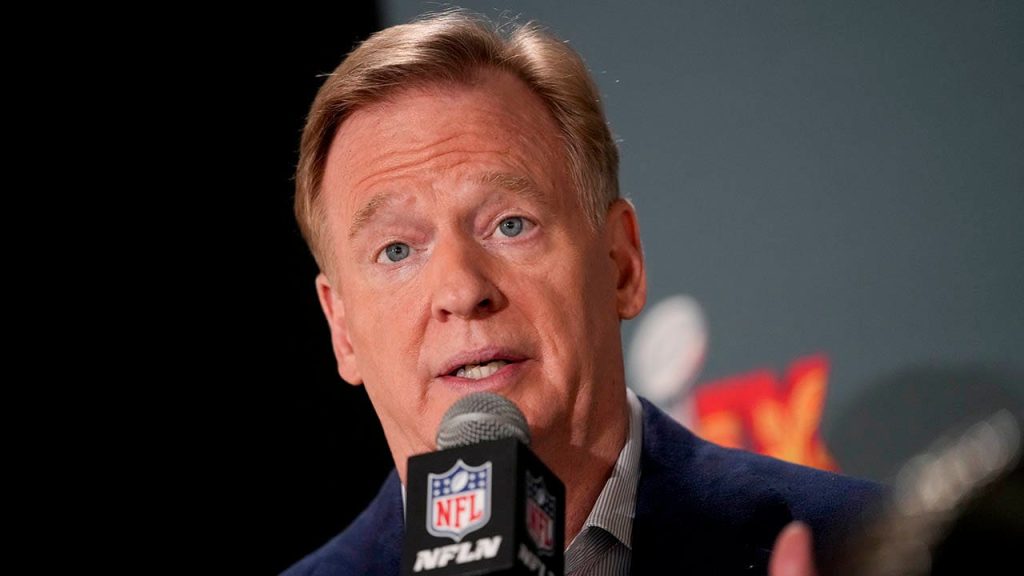NFL Commissioner Roger Goodell staunchly defended the league’s Diversity, Equity, and Inclusion (DEI) initiatives during a Super Bowl LIX pre-game press conference, emphasizing the positive impact these policies have had on the league’s overall success. This firm stance comes amidst a backdrop of political shifts, including former President Trump’s executive order dismantling federal DEI programs, and a wave of corporate reevaluations of their own DEI commitments. Goodell unequivocally stated that the NFL’s commitment to DEI is not a fleeting trend but a core principle aimed at attracting the best talent, both on and off the field. He stressed that diversity strengthens the league, mirroring the diverse communities and fanbase it serves, ultimately leading to a more robust and successful organization.
Goodell underscored the NFL’s dedication to DEI as an intrinsic value, not a reactive measure. He contrasted this with the actions of some corporations that have scaled back their DEI efforts following political pressure. He asserted that the league’s commitment is rooted in the belief that diversity fosters innovation, improves decision-making, and better reflects the diverse communities and fan base the NFL serves. This commitment is seen as a long-term strategy for sustained success, rather than a temporary response to external forces. He highlighted how DEI has demonstrably improved the league by attracting top-tier talent and enriching the perspectives within the organization.
The Commissioner addressed the Rooney Rule, often cited in discussions about diversity in the NFL. He emphasized that the rule isn’t about quotas or mandated hiring based on race or gender. Instead, it encourages teams to broaden their candidate pools, ensuring consideration of individuals from diverse backgrounds who might otherwise be overlooked. This approach aims to level the playing field and provide opportunities for talented individuals from underrepresented groups, leading to a more meritocratic and inclusive hiring process. Goodell argued that this wider net ultimately benefits the league by bringing in a greater range of talent and perspectives.
Goodell’s comments also highlighted the business case for DEI, drawing parallels with practices adopted by global corporations. He pointed out that many companies voluntarily embrace diverse hiring practices not simply for ethical reasons, but because it’s good for business. By tapping into a wider talent pool, organizations can gain access to fresh perspectives, innovative ideas, and a deeper understanding of diverse customer bases. He positioned the NFL’s commitment to DEI as aligning with this broader trend in the corporate world, where diversity is increasingly seen as a key driver of innovation and growth.
Addressing the potential influence of corporate sponsors who might be reconsidering their own DEI policies, Goodell maintained the NFL’s independent stance. He emphasized that the league’s DEI policies are not dictated by sponsors or partners, although the league engages in ongoing conversations about the importance of these initiatives. This underscores the NFL’s commitment to charting its own course on DEI, regardless of external pressures. He acknowledged the complex and evolving landscape of DEI in the corporate world, noting that many companies are reevaluating their approaches. However, he reaffirmed the NFL’s unwavering dedication to its own DEI strategy.
Goodell expressed immense pride in the NFL’s DEI progress, crediting these initiatives with making the league stronger and more successful. He firmly believes that the inclusion of diverse voices, perspectives, and backgrounds leads to better decision-making and a more robust organization, both on and off the field. He envisions the league’s commitment to DEI as a lasting legacy, contributing to the NFL’s continued success for years to come. This long-term perspective underscores the deep integration of DEI into the league’s overall vision and strategy.

